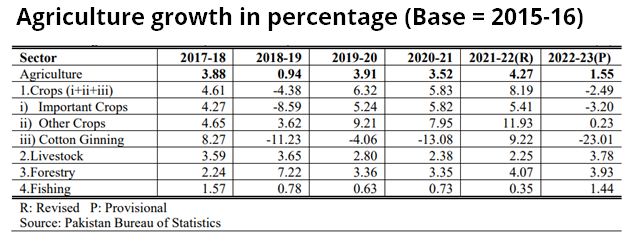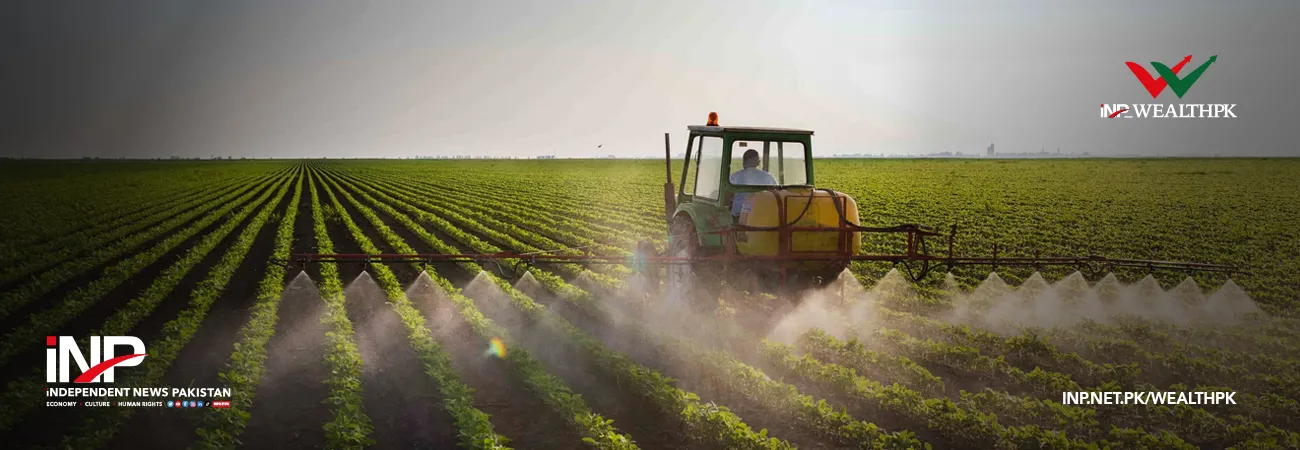INP-WealthPk
Azeem Ahmed Khan
With a fast-growing population, Pakistan needs to strengthen its agriculture sector with modern methods and technologies to bolster its economy and achieve food security and self-sufficiency. Agriculture is the backbone of Pakistan's economy, contributing 22.9% to the gross domestic product (GDP) and generating 37.4% of employment. Additionally, it provides raw materials to the industrial sector and constitutes 80% of the country's total export earnings. However, to fully realise its potential as a producer and exporter of agricultural goods, Pakistan must advance its farming practices. The significance of agriculture has not been overlooked by the government, which has set an ambitious goal of achieving 3.5% growth in this sector for the current fiscal year. Achieving improved agricultural production requires proactive measures to mitigate the negative impacts of climate change, encourage research and development, and implement contemporary technologies.

Pakistan is among the world's top producers of various crops such as wheat, cotton, sugarcane, mango, dates, kinnow orange, and rice. Major and minor crops combined contribute significantly to the country's GDP. Nonetheless, the agriculture sector has suffered from climatic shocks in recent years, affecting crop yields. Climate change poses a serious threat to agriculture, leading to more frequent extreme weather events and unpredictable rainfall patterns. According to the Pakistan Economic Survey 2022-23, cotton crop was badly damaged inFY23 owing to changes in climate, which affected cotton germination, and seedlings growth, and caused leaf wilting. All Pakistan Fruit and Vegetable Exporters, Importers and Merchants Association Patron-in-Chief Waheed Ahmed told WealthPK that the mango production was reduced by 50% last year due to unusually high temperatures,and is expected to remain up to 25% less than normal this year because of prolonged winter and new diseases. He said the researchers should tell the farmers how to tackle such situations. To address the challenges faced by the agriculture sector and take advantage of modern science and technology, the government has initiated the Agriculture Revolution 2.0, also known as the second green revolution.
This programme aims to achieve agricultural self-sufficiency and increase exports by utilising cutting-edge technology and high-quality seeds. Improved seeds play a crucial role in increasing agricultural productivity, enhancing food security, and alleviating poverty. The government should also assist farmers in importing the latest agricultural machinery and equipment by providing them with incentives, as farm mechanisation accelerates the sector's growth rate. Among the modern farming methods gaining popularity are tunnel farming, precision farming, hydroponics, aquaponics, and vertical farming. Precision farming and controlled-environment agriculture technologies optimise plant growth by managing all environmental factors. Hydroponics, on the other hand, involves growing plants in a water-based solution enriched with nutrients. Tunnel farming is another innovative agriculture technique in which crops are grown in long rows under protective row covers. This method shields the crops from adverse environmental factors such as rain, hail, snow, wind, frost, and pests. By obtaining off-season crops and significantly increasing production compared to traditional methods, tunnel farming contributes to food security and economic growth.
Technologies such as crop simulation models, remote sensing, and climate modelling aid in adapting to the changes, enabling farmers to make informed decisions regarding crops, planting times, and water management. This boosts resilience and reduces vulnerability. Remote sensing, satellite imaging, and drones with multi-spectral sensors help identify plant stress, pests, or diseases early, enabling timely intervention and reducing the need for pesticides. It enhances crop quality and, in some cases, increases yields, making farming more profitable. Moreover, intercropping, the practice of cultivating two or more crops concurrently on the same field, is crucial for achieving food self-sufficiency and increasing farmer profitability. Intercropping maximises the use of natural resources such as sunlight, water, and nutrients, leading to higher yields per acre and increased revenue. It also serves as crop failure insurance by reducing the risk of total crop loss, ensuring a steady income for farmers. The adoption of modern agricultural practices is essential for Pakistan's sustainable development, poverty reduction, and food security. To fully harness the potential of Pakistan's agricultural sector and make it a thriving force in the global market, collaboration between the government, farmers, and academics is of paramount importance. By investing in R&D and implementing advanced technologies, Pakistan can overcome its agricultural challenges and pave the way for a prosperous future.
Credit: INP-WealthPk




